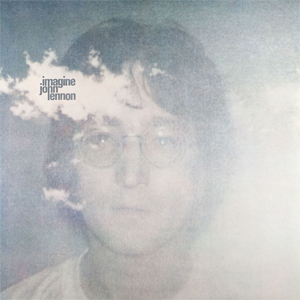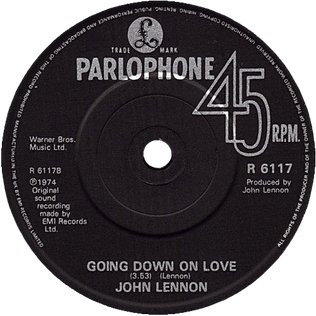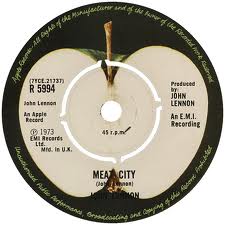Related Research Articles

Imagine is the second studio album by British musician John Lennon, released on 9 September 1971 by Apple Records. Co-produced by Lennon, his wife Yoko Ono and Phil Spector, the album's elaborate sound contrasts the basic, small-group arrangements of his first album, John Lennon/Plastic Ono Band (1970), while the opening title track is widely considered to be his signature song.

Mind Games is the fourth studio album by English musician John Lennon. It was recorded at Record Plant Studios in New York in summer 1973. The album was released in the US on 29 October 1973 and in the UK on 16 November 1973. It was Lennon's first self-produced recording without help from Phil Spector. Like his previous album, the politically topical and somewhat abrasive Some Time in New York City, Mind Games received mixed reviews upon release. It reached number 13 in the UK and number 9 in the US, where it was certified gold.
"Surprise, Surprise " is a song written by John Lennon that was first released on his 1974 album Walls and Bridges. Elton John contributes harmony vocals to the song.

"It's So Hard" is a song written and performed by John Lennon, which first appeared on his 1971 album Imagine. Shortly after the album's release, the song was issued as the B-side to the single "Imagine". In Mexico, it was released on an EP with "Imagine", "Oh My Love" and "Gimme Some Truth". In 1986, a live performance from 30 August 1972 was issued on Lennon's live album Live in New York City.
"Well Well Well" is a song by English musician John Lennon from his 1970 album John Lennon/Plastic Ono Band. The eighth and longest track on the album, "Well Well Well" features an aggressive guitar sound, screaming vocals and a pounding backing track.

"My Mummy's Dead" is the closing song on the album John Lennon/Plastic Ono Band by John Lennon. The song was also released on a Mexican EP that also contained "Mother", "Isolation" and "Look at Me".

"Going Down on Love" is a song by John Lennon, released as the first track on his 1974 album Walls and Bridges. It was also released as the B-side of Lennon's "Jealous Guy" single in 1985.
"Old Dirt Road" is a song written by John Lennon and Harry Nilsson, first released on Lennon's 1974 album Walls and Bridges. Nilsson later recorded the song on his 1980 album Flash Harry.

"I'm Losing You" is a song written by John Lennon and released on his 1980 album Double Fantasy. It was written in Bermuda in June 1980, after several attempts by Lennon to call his wife, Yoko Ono, who remained in New York. The song is also available on the 1982 compilation The John Lennon Collection, the 1998 boxset John Lennon Anthology, the one disc compilation Wonsaponatime, the 2005 two disc compilation Working Class Hero: The Definitive Lennon and in 2010 for the Gimme Some Truth album. The song was also featured in the 2005 musical Lennon.
"Aisumasen (I'm Sorry)" is a song written by John Lennon released on his 1973 album Mind Games. The song is included on the 1990 box set Lennon.
"Out the Blue" is a song written by John Lennon and originally released on his 1973 album Mind Games. The song is included on the 1990 boxset Lennon, the 2005 two-disc compilation Working Class Hero: The Definitive Lennon, the 2010 album Gimme Some Truth and the 2020 compilation album Gimme Some Truth. The Ultimate Mixes.
"I Know (I Know)" is a song written by John Lennon released on his 1973 album Mind Games. The song is included on the 1998 box set John Lennon Anthology and the 2020 compilation album Gimme Some Truth. The Ultimate Mixes.

"Meat City" is a song written by John Lennon, released as the 12th and final track on his 1973 album Mind Games. The song is also the B-side of the single of the same name, and is included on the 2010 album, Gimme Some Truth.

"Sisters, O Sisters", also known as "Sisters O Sisters", is a song written by Yoko Ono that first appeared on John Lennon's and Yoko Ono's 1972 Plastic Ono Band album Some Time in New York City, backed by Elephant's Memory. It was also released as the b-side to the couple's "Woman Is the Nigger of the World" single. It has been covered by a number of artists, including Le Tigre and Tater Totz.
"New York City" is a song written by John Lennon that was first released on Lennon's and Yoko Ono's 1972 Plastic Ono Band album Some Time in New York City.

"What You Got" is a song written by John Lennon that was first released on his 1974 album Walls and Bridges. It was later released as the B-side to his top 10 #9 Dream single.
"Scared" is a song written by John Lennon that was first released on his 1974 album Walls and Bridges. Alternate versions were subsequently released on the compilation albums Menlove Ave. and John Lennon Anthology.

"Listen, the Snow Is Falling" is a song written by Yoko Ono and recorded by Ono and the Plastic Ono Band that was first released as the B-side of John Lennon's 1971 single "Happy Xmas ." A version of the song was later released on a reissue of Lennon and Ono's Wedding Album and was covered by Galaxie 500.
"Sunday Bloody Sunday" is a song written by John Lennon and Yoko Ono that was first released on their 1972 Plastic Ono Band album with Elephant's Memory, Some Time in New York City. The song addresses the Bloody Sunday massacre of 1972 and is one of two on the album that addresses the contemporary Northern Ireland conflict, "The Luck of the Irish" being the other.

"Beef Jerky" is an instrumental written by John Lennon that was released on his 1974 album Walls and Bridges and also as the b-side of the lead single from that album, the #1 hit "Whatever Gets You thru the Night."
References
- 1 2 3 "John Lennon: I Don't Want To Be A Soldier | The Beatles Bible". www.beatlesbible.com. 3 August 2010. Retrieved 15 January 2017.
- 1 2 3 du Noyer, Paul (1999). John Lennon: Whatever Gets You Through the Night. Thunder's Mouth Press. pp. 45–46. ISBN 1560252103.
- 1 2 Rogan, Johnny (1997). The Complete Guide to the Music of John Lennon. Omnibus Press. pp. 53–54. ISBN 0711955999.
- 1 2 3 4 5 6 Urish, B.; Bielen, K. (2007). The Words and Music of John Lennon. Praeger. pp. 29–30. ISBN 978-0-275-99180-7.
- 1 2 Gerson, Ben (28 October 1971). "Imagine". Rolling Stone . Retrieved 20 July 2017.
- ↑ Christgau, Robert (1981). "John Lennon: Imagine". Christgau's Record Guide: Rock Albums of the Seventies . Ticknor & Fields. ISBN 0899190251 . Retrieved 2 November 2018.
- ↑ Blaney, J. (2007). Lennon and McCartney: Together Alone – A critical discography of their solo work. Jawbone Press. p. 54. ISBN 9781906002022.
- ↑ "Cover versions of I Don't Want to Be a Soldier by John Lennon | SecondHandSongs". secondhandsongs.com. Retrieved 20 July 2017.